formerly eScholarship Editions


|
|
|
|
Your request for similar items found 20 book(s). | Modify Search | Displaying 1 - 20 of 20 book(s) | |
| 1. | 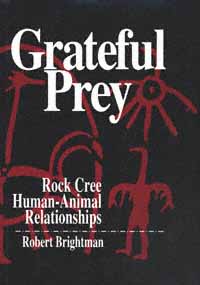 | Title: Grateful prey: Rock Cree human-animal relationships Author: Brightman, Robert Alain 1950- Published: University of California Press, 1993 Subjects: Anthropology | Anthropology | United States History | Religion Publisher's Description: The interaction between religious beliefs and hunting practices among the Asiniskawidiniwak or Rock Crees of northern Manitoba is the focus of Robert Brightman's detailed study. This foraging society, he says, bases aspects of its hunting and trapping largely on what we call "religious" conceptions.Seeking an ideology, however, that incorporates Cree beliefs about human-animal differences and the relationships that should exist between them as hunter and prey, Brightman finds these beliefs to be disordered and unstable rather than systematic. Animals are represented as simultaneously more and less powerful than humans. The hunter-prey relationship is talked about as both collaborative and adversarial. Exploring the influence of these religious representations on technical aspects of subsistence historically, Brightman finds that Crees' attitudes and actions toward animals were, and are, relatively arbitrary with respect to biological and environmental forces. Anthropologists will see in his well-researched discussion a challenge to prevailing ecological and Marxist approaches to foraging societies. [brief] Similar Items |
| 2. | 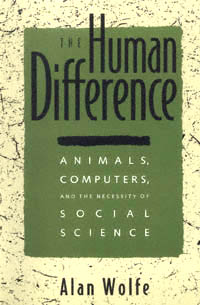 | Title: The human difference: animals, computers, and the necessity of social science Author: Wolfe, Alan 1942- Published: University of California Press, 1993 Subjects: Sociology | Social Theory | Political Theory | Postcolonial Studies | Religion | Christianity Similar Items |
| 3. | 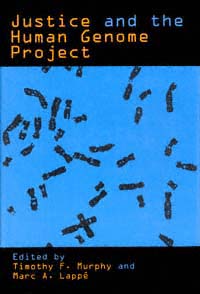 | Title: Justice and the human genome project Author: Murphy, Timothy F 1955- Published: University of California Press, 1994 Subjects: Philosophy | Ethics | Biology | Medicine Publisher's Description: The Human Genome Project is an expensive, ambitious, and controversial attempt to locate and map every one of the approximately 100,000 genes in the human body. If it works, and we are able, for instance, to identify markers for genetic diseases long before they develop, who will have the right to obtain such information? What will be the consequences for health care, health insurance, employability, and research priorities? And, more broadly, how will attitudes toward human differences be affected, morally and socially, by the setting of a genetic "standard"?The compatibility of individual rights and genetic fairness is challenged by the technological possibilities of the future, making it difficult to create an agenda for a "just genetics." Beginning with an account of the utopian dreams and authoritarian tendencies of historical eugenics movements, this book's nine essays probe the potential social uses and abuses of detailed genetic information. Lucid and wide-ranging, these contributions will provoke discussion among bioethicists, legal scholars, and policy makers. [brief] Similar Items |
| 4. | 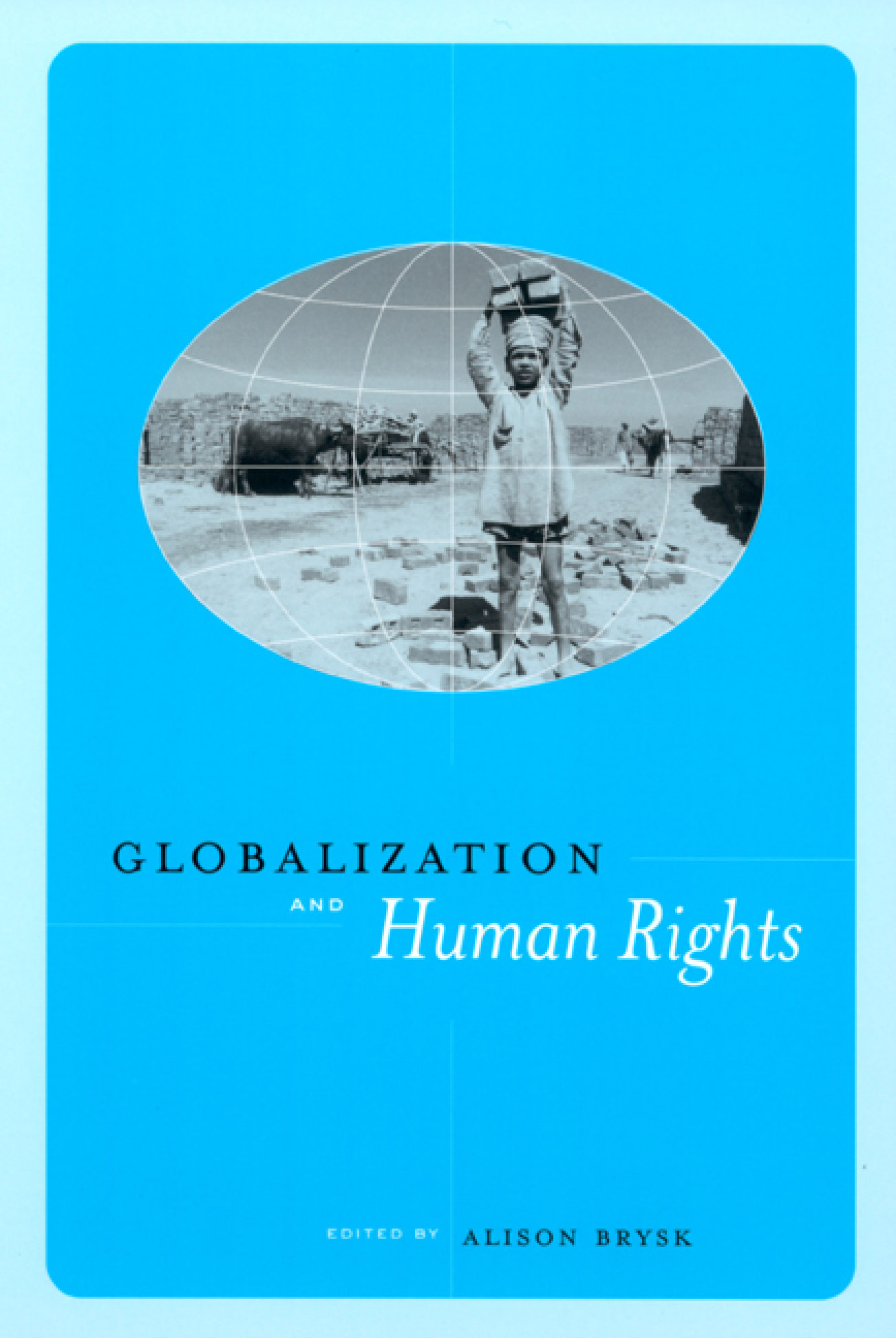 | Title: Globalization and human rights Author: Brysk, Alison 1960- Published: University of California Press, 2002 Subjects: Politics | International Relations Publisher's Description: In this landmark volume, Alison Brysk has assembled an impressive array of scholars to address new questions about globalization and human rights. Is globalization generating both problems and opportunities? Are new problems replacing or intensifying state repression? How effective are new forms of human rights accountability? These essays include theoretical analyses by Richard Falk, Jack Donnelly, and James Rosenau. Chapters on sex tourism, international markets, and communications technology bring new perspectives to emerging issues. The authors investigate places such as the Dominican Republic, Nigeria, and the Philippines. The contemporary world is defined by globalization. While global human rights standards and institutions have been established, assaults on human dignity continue. These essays identify the new challenges to be faced, and suggest new ways to remedy the costs of globalization. [brief] Similar Items |
| 5. | 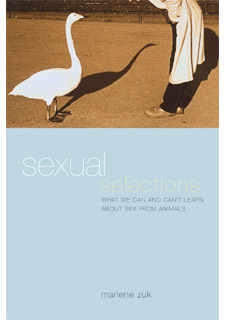 | Title: Sexual selections: what we can and can't learn about sex from animals Author: Zuk, M. (Marlene) Published: University of California Press, 2002 Subjects: Organismal Biology | Cultural Anthropology | Evolution | Gender Studies | Animal Behavior | Sociology | Biology Publisher's Description: Scientific discoveries about the animal kingdom fuel ideological battles on many fronts, especially battles about sex and gender. We now know that male marmosets help take care of their offspring. Is this heartening news for today's stay-at-home dads? Recent studies show that many female birds once thought to be monogamous actually have chicks that are fathered outside the primary breeding pair. Does this information spell doom for traditional marriages? And bonobo apes take part in female-female sexual encounters. Does this mean that human homosexuality is natural? This highly provocative book clearly shows that these are the wrong kinds of questions to ask about animal behavior. Marlene Zuk, a respected biologist and a feminist, gives an eye-opening tour of some of the latest developments in our knowledge of animal sexuality and evolutionary biology. Sexual Selections exposes the anthropomorphism and gender politics that have colored our understanding of the natural world and shows how feminism can help move us away from our ideological biases. As she tells many amazing stories about animal behavior--whether of birds and apes or of rats and cockroaches--Zuk takes us to the places where our ideas about nature, gender, and culture collide. Writing in an engaging, conversational style, she discusses such politically charged topics as motherhood, the genetic basis for adultery, the female orgasm, menstruation, and homosexuality. She shows how feminism can give us the tools to examine sensitive issues such as these and to enhance our understanding of the natural world if we avoid using research to champion a feminist agenda and avoid using animals as ideological weapons. Zuk passionately asks us to learn to see the animal world on its own terms, with its splendid array of diversity and variation. This knowledge will give us a better understanding of animals and can ultimately change our assumptions about what is natural, normal, and even possible. [brief] Similar Items |
| 6. | 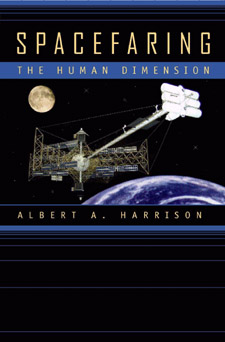 | Title: Spacefaring: the human dimension Author: Harrison, Albert A Published: University of California Press, 2001 Subjects: Science | Technology and Society | Psychology Publisher's Description: The stars have always called us, but only for the past forty years or so have we been able to respond by traveling in space. This book explores the human side of spaceflight: why people are willing to brave danger and hardship to go into space; how human culture has shaped past and present missions; and the effects of space travel on health and well-being. A comprehensive and authoritative treatment of its subject, this book combines statistical studies, rich case histories, and gripping anecdotal detail as it investigates the phenomenon of humans in space - from the earliest spaceflights to the missions of tomorrow. Drawing from a strong research base in the behavioral sciences, Harrison covers such topics as habitability, crew selection and training, coping with stress, group dynamics, accidents, and more. In addition to taking a close look at spacefarers themselves, Spacefaring reviews the broad organizational and political contexts that shape human progress toward the heavens. With the ongoing construction of the International Space Station, the human journey to the stars continues, and this book will surely help guide the way. [brief] Similar Items |
| 7. | 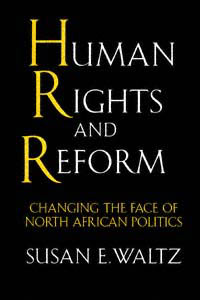 | Title: Human rights and reform: changing the face of North African politics Author: Waltz, Susan Eileen Published: University of California Press, 1995 Subjects: Politics | History | Middle Eastern Studies | Middle Eastern History | African History | African Studies Publisher's Description: Independence from colonial rule did not usher in the halcyon days many North Africans had hoped for, as the new governments in Morocco, Tunisia, and Algeria soon came to rely on repression to reinforce and maintain power. In response to widespread human rights abuses, individuals across the Maghrib began to form groups in the late 1970s to challenge the political practices and structures in the region, and over time these independent human rights organizations became prominent political actors. The activists behind them are neither saints nor revolutionaries, but political reformers intent on changing political patterns that have impeded democratization.This study, the first systematic comparative analysis of North African politics in more than a decade, explores the ability of society, including Islamist forces, to challenge the powers of states. Locating Maghribi polities within their cultural and historical contexts, Waltz traces state-society relations in the contemporary period. Even as Algeria totters at the brink of civil war and security concerns rise across the region, the human rights groups Susan Waltz examines implicitly challenge the authoritarian basis of political governance. Their efforts have not led to the democratic transition many had hoped, but human rights have become a crucial new element of North African political discourse. [brief] Similar Items |
| 8. | 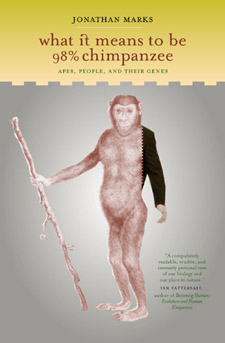 | Title: What it means to be 98% chimpanzee: apes, people, and their genes Author: Marks, Jonathan (Jonathan M.) 1955- Published: University of California Press, 2002 Subjects: EcologyEvolutionEnvironment | Evolution | Physical Anthropology | Sociology | Medicine | Mammalogy Publisher's Description: The overwhelming similarity of human and ape genes is one of the best-known facts of modern genetic sciencenm. But what does this similarity mean? Does it, as many have suggested, have profound implications for understanding human nature? Well-known molecular anthropologist Jonathan Marks uses the human-versus-ape controversy as a jumping-off point for a radical reassessment of a range of provocative issues--from the role of science in society to racism, animal rights, and cloning. Full of interesting facts, fascinating personalities, and vivid examples that capture times and places, this work explains and demystifies human genetic science--showing ultimately how it has always been subject to social and political influences and teaching us how to think critically about its modern findings. Marks presents the field of molecular anthropology--a synthesis of the holistic approach of anthropology with the reductive approach of molecular genetics--as a way of improving our understanding of the science of human evolution. As he explores the intellectual terrain of this field, he lays out its broad areas of interest with issues ranging from the differences between apes and humans to the biological and behavioral variations expressed in humans as a species. Marks confronts head-on the problems of racial classification in science. He describes current theories about race and uses work in primatology, comparative anatomy, and molecular anthropology to debunk them. He also sheds new light on the controversial Great Ape Project, the Human Genome Diversity Project, and much more. This iconoclastic, witty, and extremely readable book illuminates the deep background of human variation and asks us to reconsider the role of science in modern society. [brief] Similar Items |
| 9. | 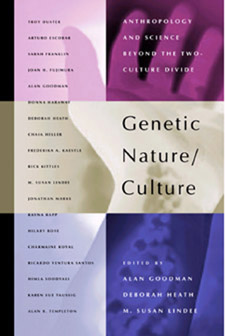 | Title: Genetic nature/culture: anthropology and science beyond the two-culture divide Author: Goodman, Alan H Published: University of California Press, 2003 Subjects: Anthropology | Biology | Sociology Publisher's Description: The so-called science wars pit science against culture, and nowhere is the struggle more contentious - or more fraught with paradox - than in the burgeoning realm of genetics. A constructive response, and a welcome intervention, this volume brings together biological and cultural anthropologists to conduct an interdisciplinary dialogue that provokes and instructs even as it bridges the science/culture divide. Individual essays address issues raised by the science, politics, and history of race, evolution, and identity; genetically modified organisms and genetic diseases; gene work and ethics; and the boundary between humans and animals. The result is an entree to the complicated nexus of questions prompted by the power and importance of genetics and genetic thinking, and the dynamic connections linking culture, biology, nature, and technoscience. The volume offers critical perspectives on science and culture, with contributions that span disciplinary divisions and arguments grounded in both biological perspectives and cultural analysis. An invaluable resource and a provocative introduction to new research and thinking on the uses and study of genetics, Genetic Nature/Culture is a model of fruitful dialogue, presenting the quandaries faced by scholars on both sides of the two-cultures debate. [brief] Similar Items |
| 10. | 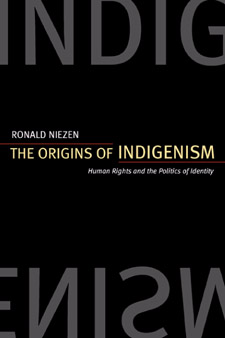 | Title: The origins of indigenism: human rights and the politics of identity Author: Niezen, Ronald Published: University of California Press, 2003 Subjects: Anthropology | Ethnic Studies | International Relations | Social Problems Publisher's Description: "International indigenism" may sound like a contradiction in terms, but it is indeed a global phenomenon and a growing form of activism. In his fluent and accessible narrative, Ronald Niezen examines the ways the relatively recent emergence of an internationally recognized identity - "indigenous peoples" - intersects with another relatively recent international movement - the development of universal human rights laws and principles. This movement makes use of human rights instruments and the international organizations of states to resist the political, cultural, and economic incursions of individual states. The concept "indigenous peoples" gained currency in the social reform efforts of the International Labor Organization in the 1950s, was taken up by indigenous nongovernmental organizations, and is now fully integrated into human rights initiatives and international organizations. Those who today call themselves indigenous peoples share significant similarities in their colonial and postcolonial experiences, such as loss of land and subsistence, abrogation of treaties, and the imposition of psychologically and socially destructive assimilation policies. Niezen shows how, from a new position of legitimacy and influence, they are striving for greater recognition of collective rights, in particular their rights to self-determination in international law. These efforts are influencing local politics in turn and encouraging more ambitious goals of autonomy in indigenous communities worldwide. [brief] Similar Items |
| 11. | 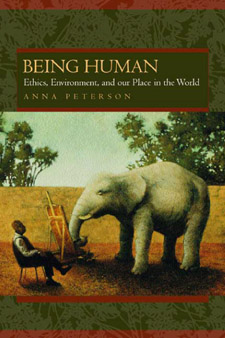 | Title: Being human: ethics, environment, and our place in the world Author: Peterson, Anna Lisa 1963- Published: University of California Press, 2001 Subjects: Religion | Folklore and Mythology | Environmental Studies | Philosophy Publisher's Description: Being Human examines the complex connections among conceptions of human nature, attitudes toward non-human nature, and ethics. Anna Peterson proposes an "ethical anthropology" that examines how ideas of nature and humanity are bound together in ways that shape the very foundations of cultures. Peterson discusses mainstream Western understandings of what it means to be human, as well as alternatives to these perspectives, and suggests that the construction of a compelling, coherent environmental ethics will revise our ideas not only about nature but also about what it means to be human. [brief] Similar Items |
| 12. | 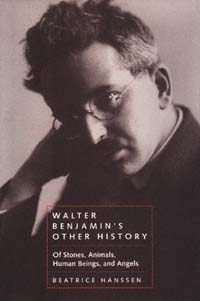 | Title: Walter Benjamin's other history: of stones, animals, human beings, and angels Author: Hanssen, Beatrice Published: University of California Press, 1998 Subjects: Philosophy | Rhetoric | German Studies | Literature Publisher's Description: Long considered to be an impenetrable, hermetic treatise, Walter Benjamin's The Origin of German Tragic Drama has rarely received the attention it deserves as a key text, central to a full understanding of his work. In this critically acclaimed study, distinguished Benjamin scholar Beatrice Hanssen . . . [more] Similar Items |
| 13. | 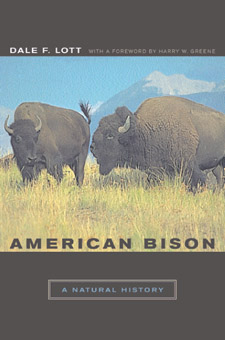 | Title: American bison: a natural history Author: Lott, Dale F Published: University of California Press, 2002 Subjects: Organismal Biology | Mammalogy | Animals | Animal Behavior | Science | Natural History Publisher's Description: American Bison combines the latest scientific information and one man's personal experience in an homage to one of the most magnificent animals to have roamed America's vast, vanished grasslands. Dale F. Lott, a distinguished behavioral ecologist who was born on the National Bison Range and has studied the buffalo for many years, relates what is known about this iconic animal's life in the wild and its troubled history with humans. Written with unusual grace and verve, American Bison takes us on a journey into the bison's past and shares a compelling vision for its future, offering along the way a valuable introduction to North American prairie ecology. We become Lott's companions in the field as he acquaints us with the social life and physiology of the bison, sharing stories about its impressive physical prowess and fascinating relationships. Describing the entire grassland community in which the bison live, he writes about the wolves, pronghorn, prairie dogs, grizzly bears, and other animals and plants, detailing the interdependent relationships among these inhabitants of a lost landscape. Lott also traces the long and dramatic relationship between the bison and Native Americans, and gives a surprising look at the history of the hide hunts that delivered the coup de grâce to the already dwindling bison population in a few short years. This book gives us a peek at the rich and unique ways of life that evolved in the heart of America. Lott also dismantles many of the myths we have created about these ways of life, and about the bison in particular, to reveal the animal itself: ruminating, reproducing, and rutting in its full glory. His portrait of the bison ultimately becomes a plea to conserve its wildness and an eloquent meditation on the importance of the wild in our lives. [brief] Similar Items |
| 14. | 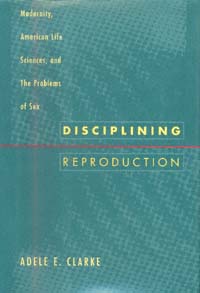 | Title: Disciplining reproduction: modernity, American life sciences, and "the problems of sex" Author: Clarke, Adele Published: University of California Press, 1998 Subjects: Sociology | Medical Anthropology | Medicine | American Studies | Gender Studies Publisher's Description: Reproductive issues from sex and contraception to abortion and cloning have been controversial for centuries, and scientists who attempted to turn the study of reproduction into a discipline faced an uphill struggle. Adele Clarke's engrossing story of the search for reproductive knowledge across the twentieth century is colorful and fraught with conflict.Modern scientific study of reproduction, human and animal, began in the United States in an overlapping triad of fields: biology, medicine, and agriculture. Clarke traces the complicated paths through which physiological approaches to reproduction led to endocrinological approaches, creating along the way new technoscientific products from contraceptives to hormone therapies to new modes of assisted conception - for both humans and animals. She focuses on the changing relations and often uneasy collaborations among scientists and the key social worlds most interested in their work - major philanthropists and a wide array of feminist and medical birth control and eugenics advocates - and recounts vividly how the reproductive sciences slowly acquired standing.By the 1960s, reproduction was disciplined, and the young and contested scientific enterprise proved remarkably successful at attracting private funding and support. But the controversies continue as women - the targeted consumers - create their own reproductive agendas around the world. Elucidating the deep cultural tensions that have permeated reproductive topics historically and in the present, Disciplining Reproduction gets to the heart of the twentieth century's drive to rationalize reproduction, human and nonhuman, in order to control life itself. [brief] Similar Items |
| 15. | 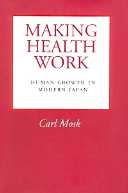 | Title: Making health work: human growth in modern Japan Author: Mosk, Carl Published: University of California Press, 1996 Subjects: Sociology | Demography | Japan | Asian History | Economics and Business Publisher's Description: Mosk shows how population quality provides a key to understanding economic growth and social change in Japan. Similar Items |
| 16. |  | Title: Boundaries: the making of France and Spain in the Pyrenees Author: Sahlins, Peter Published: University of California Press, 1989 Subjects: History | Anthropology | European History | Geography | French Studies Similar Items |
| 17. | 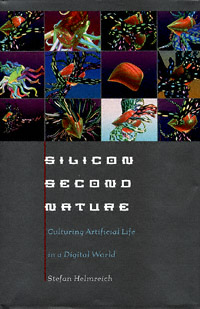 | Title: Silicon second nature: culturing artificial life in a digital world Author: Helmreich, Stefan 1966- Published: University of California Press, 1998 Subjects: Science | Computer Science | Biology | Technology and Society | Social Theory | Cultural Anthropology | California and the West Publisher's Description: Silicon Second Nature takes us on an expedition into an extraordinary world where nature is made of bits and bytes and life is born from sequences of zeroes and ones. Artificial Life is the brainchild of scientists who view self-replicating computer programs - such as computer viruses - as new forms of life. Anthropologist Stefan Helmreich's look at the social and simulated worlds of Artificial Life - primarily at the Santa Fe Institute, a well-known center for studies in the sciences of complexity - introduces readers to the people and programs connected with this unusual hybrid of computer science and biology.When biology becomes an information science, when DNA is downloaded into virtual reality, new ways of imagining "life" become possible. Through detailed dissections of the artifacts of Artifical Life, Helmreich explores how these novel visions of life are recombining with the most traditional tales told by Western culture. Because Artificial Life scientists tend to see themselves as masculine gods of their cyberspace creations, as digital Darwins exploring frontiers filled with primitive creatures, their programs reflect prevalent representations of gender, kinship, and race, and repeat origin stories most familiar from mythical and religious narratives.But Artificial Life does not, Helmreich says, simply reproduce old stories in new software. Much like contemporary activities of cloning, cryonics, and transgenics, the practice of simulating and synthesizing life in silico challenges and multiplies the very definition of vitality. Are these models, as some would claim, actually another form of the real thing? Silicon Second Nature takes Artifical Life as a symptom and source of our mutating visions of life itself. [brief] Similar Items |
| 18. | 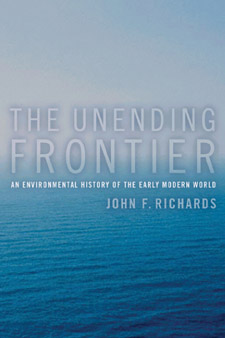 | Title: The unending frontier: an environmental history of the early modern world Author: Richards, J. F Published: University of California Press, 2003 Subjects: History | Asian History | European History | United States History | Environmental Studies | Asian Studies | African Studies Publisher's Description: It was the age of exploration, the age of empire and conquest, and human beings were extending their reach - and their numbers - as never before. In the process, they were intervening in the world's natural environment in equally unprecedented and dramatic ways. A sweeping work of environmental history, The Unending Frontier offers a truly global perspective on the profound impact of humanity on the natural world in the early modern period. John F. Richards identifies four broadly shared historical processes that speeded environmental change from roughly 1500 to 1800 c.e.: intensified human land use along settlement frontiers; biological invasions; commercial hunting of wildlife; and problems of energy scarcity. The Unending Frontier considers each of these trends in a series of case studies, sometimes of a particular place, such as Tokugawa Japan and early modern England and China, sometimes of a particular activity, such as the fur trade in North America and Russia, cod fishing in the North Atlantic, and whaling in the Arctic. Throughout, Richards shows how humans - whether clearing forests or draining wetlands, transporting bacteria, insects, and livestock; hunting species to extinction, or reshaping landscapes - altered the material well-being of the natural world along with their own. [brief] Similar Items |
| 19. | 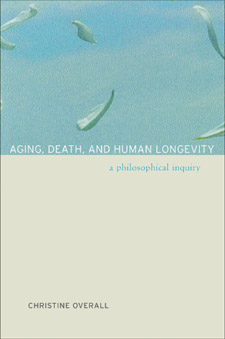 | Title: Aging, death, and human longevity: a philosophical inquiry Author: Overall, Christine 1949- Published: University of California Press, 2003 Subjects: Philosophy | Ethics | Public Policy Publisher's Description: With the help of medicine and technology we are living longer than ever before. As human life spans have increased, the moral and political issues surrounding longevity have become more complex. Should we desire to live as long as possible? What are the social ramifications of longer lives? How does a longer life span change the way we think about the value of our lives and about death and dying? Christine Overall offers a clear and intelligent discussion of the philosophical and cultural issues surrounding this difficult and often emotionally charged issue. Her book is unique in its comprehensive presentation and evaluation of the arguments - both ancient and contemporary - for and against prolonging life. It also proposes a progressive social policy for responding to dramatic increases in life expectancy. Writing from a feminist perspective, Overall highlights the ways that our biases about race, class, and gender have affected our views of elderly people and longevity, and her policy recommendations represent an effort to overcome these biases. She also covers the arguments surrounding the question of the "duty to die" and includes a provocative discussion of immortality. After judiciously weighing the benefits and the risks of prolonging human life, Overall persuasively concludes that the length of life does matter and that its duration can make a difference to the quality and value of our lives. Her book will be an essential guide as we consider our social responsibilities, the meaning of human life, and the prospects of living longer. [brief] Similar Items |
| 20. | 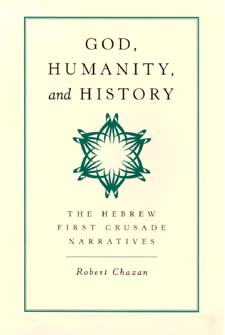 | Title: God, humanity, and history: the Hebrew First Crusade narratives Author: Chazan, Robert Published: University of California Press, 2000 Subjects: Jewish Studies | Comparative Literature | Medieval History Publisher's Description: Although closely focused on the remarkable Hebrew First-Crusade narratives, Robert Chazan's new interpretation of these texts is anything but narrow, as his title, God, Humanity, and History, strongly suggests. The three surviving Hebrew accounts of the crusaders' devastating assaults on Rhineland Jewish communities during the spring of 1096 have been examined at length, but only now can we appreciate the extent to which they represent their turbulent times. After a close analysis of the texts themselves, Chazan addresses the objectives of the three narratives. He compares these accounts with earlier Jewish history writing and with contemporary crusade historiography. It is in their disjuncture with past forms of Jewish historical narration and their amazing parallels with Latin crusade narratives that the Hebrew narratives are most revealing. We see how they reflect the embeddedness of early Ashkenazic Jewry in the vibrant atmosphere of late-eleventh- and early-twelfth-century northern Europe. [brief] Similar Items |